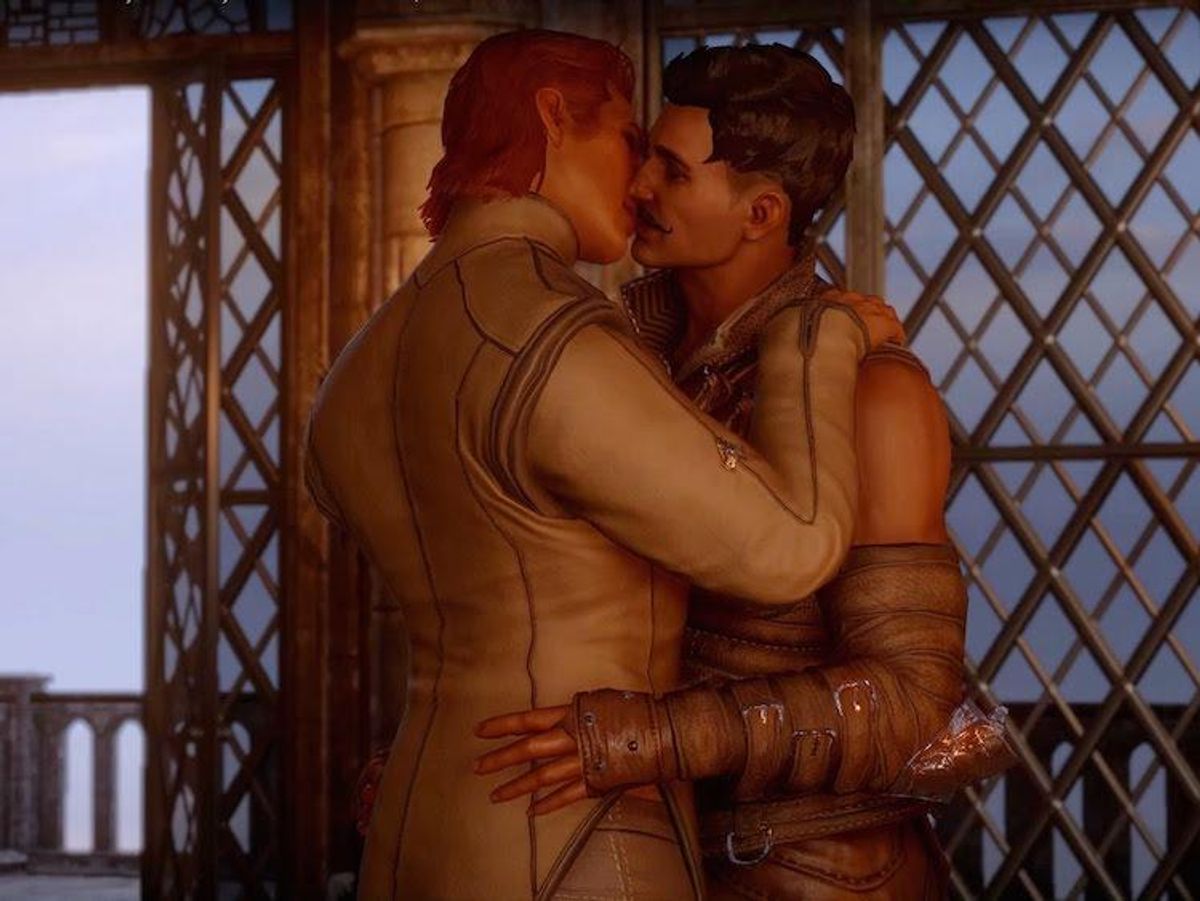
Dorian (right) in his romance scene.
It’s been a little over half a year since the release of Dragon Age: Inquisition, and video game journalists continue to marvel over “gaming’s breakout gay character.”
A new feature on the gaming site IGNtraces the development of the character Dorian, originally referred to by his creator as “fully gay.”
Prior to Bioware’s Dragon Age, games had occasionally featured LGBT characters, but in almost all cases, they were only queer if the player specifically made the choice that they should be. Dorian was the first major example of a character who could only be gay, after decades of characters who could only be straight.
Dorian’s storyline also included what could be considered an “ex-gay” allegory. His father had attempted to change his sexual orientation, and Dorian responded by running away from home. Years later in the game, the player can either choose to help Dorian reconcile with his apologetic father, or to remain estranged.
“I suppose this aspect of Dorian will make him controversial in some corners, but I was glad to include it,” series creator David Gaider told IGN in 2014. “It made writing Dorian a very personal experience for me, and I’m hopeful that will make him seem like a fully realized character to fans in the end.”
Dragon Age included another breakout character: Krem, a trans man (though that term is never used) who is accepted by in-game characters. Krem’s storyline provides players with the opportunity to ask questions, and demonstrates how one can be accepting and considerate of the feelings of trans people.
When the game came out, there was a flurry of coverage and controversy over the characters. Now that the excitement has died down a bit, it’s a good time to take a step back and examine the reaction. How did people respond to Dragon Age’s queer-inclusive content?
That depends on whom you ask.
In general, reaction to the game was overwhelmingly positive. Critically, it’s ranked at an 85 on Metacritic, with 40 positive reviews, five mixed, and zero negative. The game’s inclusion of characters like Krem and Dorian met with near-universal acclaim from game journalists and reviewers.
Gamers were generally enthusiastic as well. It was developer Bioware’s most successful launch in history, and won various Game of the Year reader’s choice awards.
But if you look at online comments, you might think that the game community has rejected Dragon Age: Inquisition. It currently has more negative than positive user reviews on Metacritic, and comments on any article about the game are full of criticism — particularly targeted at the inclusion of queer characters.
But those reactions don’t tell the full story. Even before the Gamergate campaign — an online attempt to suppress inclusive content — there was a vocal minority of gamers that actively resisted any content not targeted to young straight male players. Though a relatively small proportion of gamers, this losely-organized group continues to dominate online conversation, shouting down any conversation about content that doesn’t appeal to them.
“If it’s normal to be gay, then why does it always have to be made such a big deal of?” trolls one of the top-rated comments on the IGN article. “Propaganda,” says another. “Now let gay people be ‘normal’ people.”
Others write, “it’s so irritating how everything is catering to the LGBT crowd,” and “they just force it upon us.”
The online conversation is often dominated by the argument that most gamers are young, straight, white men, and so games that focus on any other audience will underperform.
But the strong launch and the dozens of awards indicate that popular opinion has been favorable, both from critics and consumers. Dorian may be a “breakout” character, but more like him are sure to follow.




